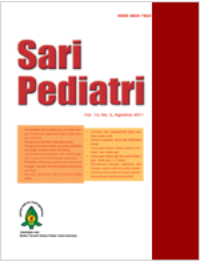Single Nucleotide Polymorphism (SNP) IL-10 (RS 1800896) pada Infeksi Bakteri Gram negatif dan TLR-2 (RS 3804099) Infeksi Bakteri Gram positif Pada Sepsis Neonatorum
Sari
Latar belakang. Sepsis neonatorum merupakan masalah kesehatan dengan tingkat morbiditas dan mortalitas yang tinggi. Kultur
darah sebagai gold standar diagnostic hanya memberikan hasil positif sekitar 40%. Latar belakang genetik saat ini diakui berkontribusi
terhadap respons imunologis inang
Tujuan. Menentukan hubungan SNP IL-10 (rs 1800896) dengan infeksi bakteri Gram negatif dan TLR-2 (rs 3804099)
dengan infeksi bakteri Gram positif pada sepsis neonatorum.
Metode. Penelitian rancangan cross sectional pada sepsis neonatorum. Subjek dengan hasil kultur darah positif dilakukan analisis
genetik single nucleotide polymorphisms IL-10 (rs1800896) dan TLR-2 (rs3804099), dengan tahapan isolasi deoxyribonucleat acid
(DNA), polymerase chain reaction (PCR), dan sekuensing DNA.
Hasil. Tidak didapatkan hasil yang bermakna (p>0,05) SNP IL-10 (rs1800896) dengan infeksi bakteri Gram negatifdan SNP TLR-2
(rs3804099) dengan infeksi bakteri Gram positif
Kesimpulan. Tidak terdapat hubungan single nucleotide polymorphism (snp) IL-10 (rs 1800896) dengan infeksi bakteri Gram
negatifdan TLR-2 (rs 3804099) dengan infeksi bakteri Gram positif pada sepsis neonatorm.
Kata Kunci
Teks Lengkap:
PDFReferensi
Shirazi H, Riaz S, Tahir R. Role of the hematological
profile in early diagnosis of neonatal sepsis. Pakistan.
Ann Pak Inst Med Sci 2010;6:152-6.
Damstadt G, Bhutta Z, Cousens S, Adam T, Walker N,
Bernis L. Evidence based, cost effective interventions:
How many newborn babies can we safe?. Lancet
;365:377-88.
Gerdes JS. Diagnosis and management of bacterial
infection in the neonate. Pediatr Clin North Am
;51:939-59.
Rekam medik. Data angka kejadian penyakit pada
pasien rawat inap periode Januari 2010–Desember 2013.
Jakarta: Depkes RI; 2010.
Zardad Muhammad AA, Umar Hayat, Muhammad
Salim Wazir, Rafiyatullah, Huma Waqas. Neonatal sepsis:
causative bacteria and their resistance to antibiotics. J
Ayub Med Coll Abbottabad 2010;224:33-5.
Marchant EA, Boyce GK, Sadarangani M, Lavoie PM.
Neonatal sepsis due to coagulase-negative staphylococci.Clin Dev Immunol 2013;2013:1-6.
Kuruvilla Pillai S, Mary J, Jana AK. Bacterial profile of
sepsis in a neonatal unit in South India. Indian Pediatri
;35:851-8.
Del Vecchio L. Genetic polymorphisms in neonatal
sepsis. Imunol Infect. 2006;2:31-7.
Abu-Maziad A, Schaa K, Bell EF, Dagle JM, Cooper
M, Marazita ML, dkk. Role of polymorphic variants as
genetic modulators of infection in neonatal sepsis. Pediatr
Res. 2010;68:323-9.
Bertrand S, Filleron A, Mesnage R, Lotthe A, Didelot M,
Burgel L. Staphylococcus aureus in a neonatal care center.
Methicillin susceptible strains should be a main concern.
Antimicrob Resist Infect Control 2014;3:1-9
Libert C, Dejager L, Pinheiro I. The X chromosome
in immune functions: when a chromosome makes the
difference. Nat Rev Immunol 2010;10:594-604.
Melville J, Moss T. The immune consequences of
preterm birth. Front Neurosci 2013;7:79. doi: 10.3389/
fnins.2013.00079.
Tumangger H, Jamil K. Constribution of genes
polymorphism to suspectibility and outcome of sepsis.
Egypt J Med Hum Gen 2010;11:97-103.
Cardoso P, Oliveira A, Botoni F, Rezende I, Filho
J, Cunha F. Interleukin-10 rs2227307 and CXCR2
rs1126579 polymorphisms modulate the predisposition
to septic shock. Mem Inst Oswaldo 2015;101:1-8.
DOI: http://dx.doi.org/10.14238/sp17.6.2016.423-7
Refbacks
- Saat ini tidak ada refbacks.
##submission.copyrightStatement##
##submission.license.cc.by-nc-sa4.footer##
Email: editorial [at] saripediatri.org


Sari Pediatri diterbitkan oleh Badan Penerbit Ikatan Dokter Anak Indonesia
Ciptaan disebarluaskan di bawah Lisensi Creative Commons Atribusi-NonKomersial-BerbagiSerupa 4.0 Internasional.




